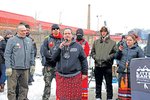
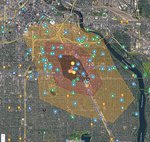
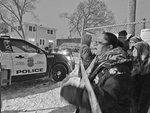
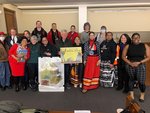


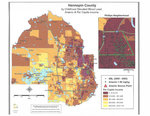
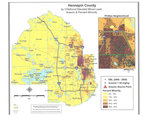
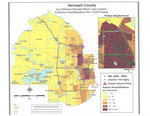
For the Indigenous people and allies living in south Minneapolis, the Roof Depot conflict is an issue of life or death. And they can back it up with data.
Their decade-long fight to stop a city-run expansion of its truck training facility continued with a recent site occupation, protests at city hall and gatherings at the State Capitol in late February and March 2023.
“The community is tired of being a sacrificial zone,” said Little Earth resident Cassie Holmes. Her son, Trinidad Flores, died at age 16 from a heart problem she attributes to the high levels of pollution in the area. It includes arsenic and lead, as well as other airborne pollutants from Interstate 94, Hiawatha Ave./Highway 55, Smith Foundry and Bituminous Roadways. Her best friend’s daughter also died of a heart issue.
The area has high levels of asthma and heart disease. Studies have shown that the pollution also gathers over South High School just three blocks directly south of the Roof Depot site, affecting all of the students and staff there each day. Teenagers from throughout Corcoran, Longfellow and Seward attend South High.
The Metropolitan Urban Indian Directors’ (MUID) 25 organizations collectively oppose the Hiawatha Expansion Project. “The membership of MUID believes there are better community-led, green initiatives to be pursued that will better mitigate the negative social determinants of health caused by environmental racism,” they wrote in a letter to the city. “American Indian people in the Phillips Neighborhood suffer from the poorest health outcomes and highest rate of health disparities in the state of Minnesota.”
“Minneapolis is committing environmental racism that will further the genocide of Indigenous people and community members of south Minneapolis,” said Rachel Thunder at a press conference at 1 p.m. on Tuesday, Feb. 21, 2023 at the Roof Depot site (named Nenoocaasi Camp by protesters). Thunder is a member of the Plains Cree, part of the American Indian Movement (AIM), a Little Earth Protector, and a community member of south Minneapolis. On Feb. 22, she said, “We are standing together united and in solidarity to say we do not want the city to demolish the Roof Depot. We want to have control of the site to have an environmentally-friendly food center to feed our people and boost our economy.”
Marisa Miakonda Cummings stated, “We have suffered. We suffer from the effects of institutional and generational trauma and we live in this every day. Some times it feels like we are being left again to die…. This is the definition of institutional genocide.” She said they are standing up “because it is the right thing to do.” She added, “We’re not asking for anything outside of basic human rights.”
The community’s plan for the 7.5-acre site includes an indoor urban farm, aquaponics, solar array, very affordable housing, bike shop, and other small businesses. It would reuse the Roof Depot building and leave the arsenic-laden soil dating to the former pesticide plant encapsulated underneath.
“The Roof Depot is the heart of the Green Zone,” observed Robert Lilligren, who is a third generation self-described urban Indian, 36-year Phillips resident, White Earth member, and former city council member. He stated that he was part of the robust citizen input that resulted in the plan for the East Phillips Indoor Urban Farm, beginning in 2014. “The city has never really been interested in the plan. ... The city says things like trust and reconciliation are important. Putting them into action is required. Here is an opportunity to put those beliefs into action in a more environmentally-friendly, community-driven way.”
The city is proposing to increase the amount of vehicle traffic on the roads around the Roof Depot site, which include Hiawatha, Cedar, 26th and 28th (near the Midtown Greenway crossing) by 67 percent. Currently, a total of 1,100-1,300 heavy commercial vehicles travel a day on Hiawatha, according to the Minnesota Department of Transportation T9 Urban Freight Study in 2018. The city’s proposal increases that to about 2,000.
Also spewing pollution in the air in that area, dubbed the Arsenic Triangle, is Bituminous Roadways and the Smith Foundry, two businesses that have permits that grandfather them in and have purchased pollution offsets from other businesses in the city to continue to exist in East Phillips. Recognizing the high level of pollution already there, in 2008, the state government passed the Clark-Berglund Environmental Justice Law that prohibits additional pollution in the Arsenic Triangle around the Roof Depot site. Despite that bill, the city has continued with its plans to more than double its public works facility there.
A COMMUNITY AGAINST A CITY PLAN
Residents question why their elected officials and city staff have continued to push forward a plan that the community is against.
“The city of Minneapolis claims to listen to communities, but we have been systematically denied a voice,” observed 25-year East Phillips resident Amy Pass, who has raised two children in the neighborhood. Her brother-in-law, who grew up in East Phillips two blocks away from the Roof Depot site, needed open heart surgery in his early 40s. “Other communities have asked to have the city water yard expansion project located in their space. Why is the city so desperately insistent that it be located in East Phillips? This is about racism and power. It’s about keeping us in our place and making it clear that we can’t have what we want.”
The people of south Minneapolis have never supported the city’s proposal for the public works project, and city council representatives have passed measures back and forth over the project. Some council members have flipped their votes, including Ward 8 Council President Andrea Jenkins who supported the EPNI plan last year. Little Earth resident Jolene Jones questions the narrative that the city held meetings with the community and asked for input on the Hiawatha Expansion project. While working at Little Earth, she learned about a meeting and attended it. No one else from her community was there. When she was told that the city had sent out notifications to Little Earth residents, she pushed back. After investigating the issue, staff told her that none had actually gone out.
“How do you miss a whole community? We get our water bills. We’ve got 220 households. How did you miss us?” she asked.
The neighborhood group, EPIC (East Phillips Improvement Coalition), hosted two large community meetings at East Phillips Park in November 2017 and September 2018 with approximately 250 community members at each. Votes were taken at both as to those favoring the city’s plan or the community’s indoor urban farm project. No one at either meeting voted in favor of any of the city plans.
Public input on the city-fashioned environmental assessment worksheet in March 2021 during the COVID-19 pandemic was “unprecedented,” according to city staff. Over 1,000 people submitted comments. Only two were in support of the city’s plan. Indoor urban farm supporters point out that says something about the city’s decision-making process when one of the widest margin of citizen comments in city history is ignored.
AN OCCUPATION FEB. 21
At a press conference at 1 p.m. on Tuesday, Feb. 21 at the Roof Depot site, Thunder read out their list of demands (also available at www.defendthedepot.com):
1) Total relocation of the Hiawatha Expansion Project
2) Hand over control of Roof Depot to the community
3) Plans to remove Bituminous Roadways and Smith Foundry
4) Enact a moratorium on encampment evictions
5) Provide funding for peer support workers
6) Invest in pilot programs to shelter and services to the houseless community like the former navigation center
7) Provide funding for the community’s vision for an indoor urban farm at the Roof Depot site
A statement from Defend the Depot pointed out that East Phillips is a neighborhood with over 70% residents of color and home to the Little Earth housing development, where 38 tribes come together.
According to a Wilder Foundation Study, Indigenous people make up 1% of Minnesota’s adult population but a disproportionate 13% of the houseless population. A survey of a large encampment in Minneapolis in 2020 found that nearly half of the 282 people living there were Native. People who are homeless have higher rates of illness and die on average 12 years sooner than the general U.S. population, according to the National Health Care for the Homeless Council, and chronic medical conditions are a common cause of homelessness. Unhoused people are more likely to suffer from heart attack, hypertension, diabetes, HIV, hepatitis C, depression and substance use disorders.
Mike Forcia, a member of the American Indian Movement, pointed out that the 50th anniversary of Wounded Knee was on Feb. 27.
He stated, “We were always told to go through the process. There’s always a process. That process is a systemically racist process set up to benefit them. It’s not for us.”
The city council approved an agreement labeled as a “compromise” in city documents, that would give three acres on the corner of the 7.5-acre property to the neighborhood for development.
“We don’t want them to bring more pollution in. That’s our main point,” stressed Holmes, who serves on the East Phillips Neighborhood Institute (EPNI) board (www.eastphillipsneighborhoodinstitute.org) and the city’s Southside Green Zone committee.
“Do we want to convince our people just for three acres and still have them poison us? No.”
Jolene Jones agreed. “They can take their three acres and shove it because you’re talking about our children breathing. You’re talking about our children living past 25 and not having heart issues that we don’t understand where they got them. It’s our future and that is our children.”
OCCUPATION BROKEN UP
Over a hundred Minneapolis Police Officers and 50 squads shut down an eight-block radius around the Roof Depot site on Tuesday evening, Feb. 21, 2023, at about 6:15 p.m., and forcibly removed Indigenous people and allies who had began a peaceful occupation of the site that morning at dawn.
Cedar between 24th and 28th, along with sections of 26th and 28th between Hiawatha and Cedar were blocked for more than two hours. Neither residents nor press were allowed within two blocks of the site.
(Note: The Longfellow Nokomis Messenger/Southwest Connector arrived at the scene by 6:20 p.m. before the entire area had been blocked off with crime scene tape, and was the only media outlet at the Roof Depot fence. View video and photographs from the scene on the Messenger website, as well as Instagram and Facebook accounts. Other media, including Unicorn Riot and the Indigenious-led NDN Collective, were prevented from viewing what was occurring at the Roof Depot site, and remained at 27th and Cedar covering the gathering of protesters who were there.)
Thunder, who was arrested with seven others at the site for trespassing and released later that night, stated, “There is no trespassing on stolen land.” She was treated on Feb. 22 for a knee injury she said she received when a police officer forced her into the squad car she was stepping into.
A request to the mayor’s office and to the Minneapolis Police Department on the cost of deploying over 100 officers to protests and encampments was not answered. As of press time, an open data request to the city submitted on Feb. 24 had not been filled.
Minnesota Indian Women’s Resource Center President/CEO Marisa Miakonda Cummings read a letter on behalf of the Metropolitan Urban Indian Directors (MUID) at a Tuesday, Feb. 22 press conference. “MUID formally denounces the militaristic actions taken by the Minneapolis Police Department on the evening of Feb. 21, 2023, to dismantle a peaceful and ceremonial occupation of the Roof Depot site.… Our membership believes that such community-led civic actions are directly protected by the United States Constitution Bill of Rights regarding the right to peaceful assembly and the right for citizens to petition their government.” MUID collectively opposes the Hiawatha Expansion Project.
“Asking the Indigenous people in my neighborhood to compromise with the city is asking them to repeat the same compromises that have left them impoverished, sick, and oppressed for centuries. East Phillips has been given no reason to trust the city. In fact, we have a long history of being lied to. (Go back and read the history of the garbage burner the city wanted to locate here.) I don’t see why we should trust them with a new agreement now,” said Pass.
“We are slowly dying. We are slowly being killed,” said Holmes. “It’s affecting our kids. It’s affecting generations to come.”
Holmes asked elected officals to remember why they ran for office. “You said you were all about climate change. You said you were all about green jobs, green education, green training and all this,” she said. “This is going the opposite direction, and we need you to do the right thing.”
Comments
No comments on this item Please log in to comment by clicking here